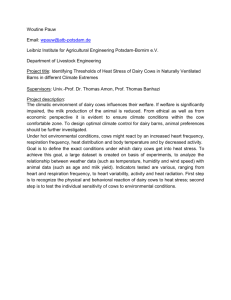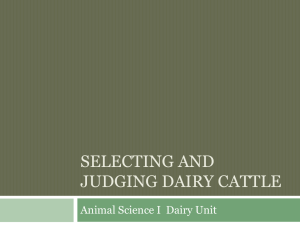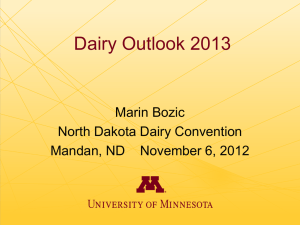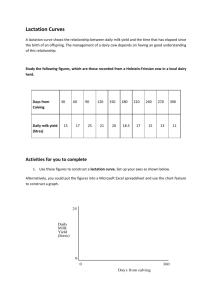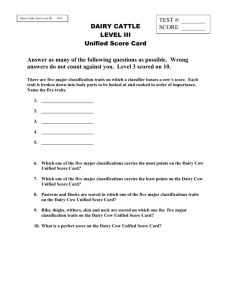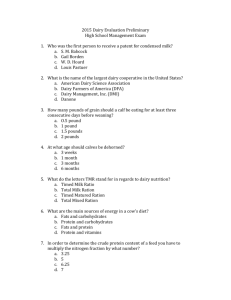Dairy Cow Farming and Dairy Processing§ Project
advertisement
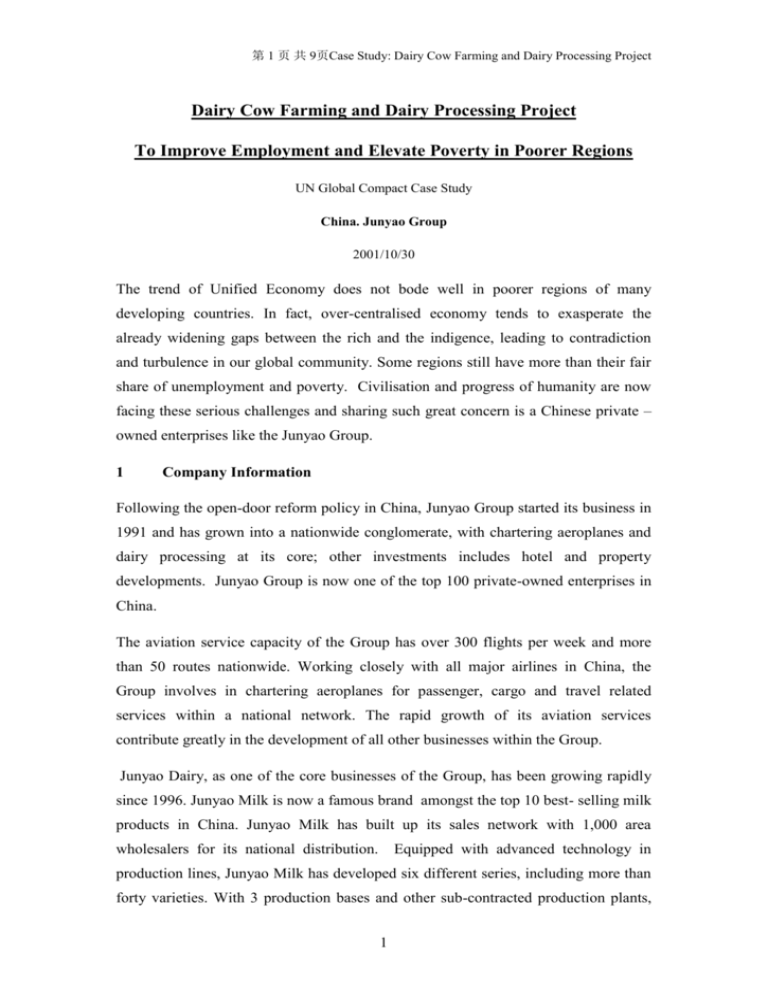
第 1 页 共 9页Case Study: Dairy Cow Farming and Dairy Processing Project Dairy Cow Farming and Dairy Processing Project To Improve Employment and Elevate Poverty in Poorer Regions UN Global Compact Case Study China. Junyao Group 2001/10/30 The trend of Unified Economy does not bode well in poorer regions of many developing countries. In fact, over-centralised economy tends to exasperate the already widening gaps between the rich and the indigence, leading to contradiction and turbulence in our global community. Some regions still have more than their fair share of unemployment and poverty. Civilisation and progress of humanity are now facing these serious challenges and sharing such great concern is a Chinese private – owned enterprises like the Junyao Group. 1 Company Information Following the open-door reform policy in China, Junyao Group started its business in 1991 and has grown into a nationwide conglomerate, with chartering aeroplanes and dairy processing at its core; other investments includes hotel and property developments. Junyao Group is now one of the top 100 private-owned enterprises in China. The aviation service capacity of the Group has over 300 flights per week and more than 50 routes nationwide. Working closely with all major airlines in China, the Group involves in chartering aeroplanes for passenger, cargo and travel related services within a national network. The rapid growth of its aviation services contribute greatly in the development of all other businesses within the Group. Junyao Dairy, as one of the core businesses of the Group, has been growing rapidly since 1996. Junyao Milk is now a famous brand amongst the top 10 best- selling milk products in China. Junyao Milk has built up its sales network with 1,000 area wholesalers for its national distribution. Equipped with advanced technology in production lines, Junyao Milk has developed six different series, including more than forty varieties. With 3 production bases and other sub-contracted production plants, 1 第 2 页 共 9页Case Study: Dairy Cow Farming and Dairy Processing Project its annual production capacity has reached 180,000 tonnes. The Dairy Company is preparing for a public listing in Shanghai Stock Exchange Market ready by the end of 2001. However, improvement in regional wealth does not necessarily impulse the prosperity of the whole nation. Hence, a Poverty Relief Project was introduced to eliminate the poverty and alleviate the unemployment situation in Yichang County, Hubei Province. 2 Yi chang Information Yichang County in Hubei Province is a comparatively under-developed county in the middle-west region of China. Lying in the city of Yichang between Gezhou Dam Reservoir and the Three Gorges Reservoir, it is 420 metres above sea level. The year round temperature is between 16.2 C to 17.4 C. The amount of rainfall is around 1,000 mm, with sunshine 1,669.3 hours per year. The frost-free season is 250 days per year. Other than Yangtze River, there are four river systems in the County. In Yichang County there are 32.73 hectares of cultivated field, of which 14.14 hectares are paddy field while18.59 hectares are dry farmland. The total production of grain is 245,000 tonnes last year, with 2.55 million Mu (170,085 hectares) for pasture cultivation. More information is as follows: Number of Town Number of Village Residential units 20 519 4,035 Number of Households 179,400 (151,200 out of them are village households) Total Population 573,100 (488,100of them are agricultural residents and the rest 85,000) Average Net Income (p.a.) 2,717 RMB 2 第 3 页 共 9页Case Study: Dairy Cow Farming and Dairy Processing Project 3 Project Background Yichang County has a unique agricultural structure, in which crops cultivation and livestock farming account for 60 % and 30% respectively. The main crops are sweet corn and rice while livestock farming are mainly pigs and chickens. The major source of income of the residents comes from agriculture. The characteristics of its farming is small-scaled, labour intensive and low value added, thus limiting the income of individuals. (Appendix: Table 1 – 3) The average income of a farmer is 2,717 RMB (US$327) but nearly 50% of the population has their net income of less than 1,000 RMB (US$120). This group of people are living under the poverty line. With the ‘Three Gorges Project’ in Changjiang (Yangtze) River, the Chinese Government is facing a big challenge to resettle the residents and ensure minimum disruption of their livelihood. In order to fully utilise natural resources of this area and help residents to increase their earnings, Junyao Group decided to introduce the ‘Poverty Relief Project’ 4 Project Scope/ Framework: In 2000, Junyao Group introduced and implemented the Project. The mission of the Project is to help resettlement of local residents and improve their living standard. The Project targets to achieve the following goals within 3 years. 8,000 household of dairy farming; 5 sample dairy farms with minimum 500 heads of dairy cows each; 30,000 Mu (2,000 hectares) of pasture for forage grass; 2,000 Mu (133 hectares) of Fish Farm; Two dairy processing plants with annual production capacity of total 140,000 tonnes; Raw milk collection stations and cold chain transportation; 3 第 4 页 共 9页Case Study: Dairy Cow Farming and Dairy Processing Project A Technological Service Centre A Genetic Engineering Research Institute The total investment of the Project involves 350 million RMB (36 million US dollars) and is divided into three phrases, executed at the same time. Phase I - Construction of a dairy plant (annual production capacity of 80,000 tonnes); - Cultivate 10,000 dairy cows in three villages and towns; - Two sample dairy farms with 500 heads of dairy cows each; - Small-scale cultivation of pasture and fish farms. Phase II - Construction of a dairy plant (60,000 tonnes of dairy products per year) - Encourage dairy cow cultivation in more towns and villages so as to reach the target of total 20,000 dairy cows - Target to have 20,000 Mu (1,334 hectares) of pasture cultivation Phase III - Establish a Genetic Engineering Research Institute and target to have a total of 30,000 dairy cows and 30,000 Mu (2,000 hectares) of pasture cultivation. Up till now, the Group has invested 150 million RMB (18 million US dollars) and achieved some encouraging results in Phase I establishments. The dairy processing capacity reached 60,000 tonnes and there are 3,000 heads of dairy cow with two sample dairy farms. Moreover, the Technological Service Centre, raw milk collection stations and cold chain transportation system are in operation. As a whole, and from the macro point of view, the planning and design of this Project are in tandem with the agriculture and rural economic development strategies of the Chinese Government. It reinforces the competitive power of agriculture products in the international market and up keep the milk processing level of China. The Project also helps to reform state-owned enterprises and eradicate poverty for 20,000 families, creating 2,000 new employment opportunities. Moreover, it helps resettlement of residents in the Three Gorges Reservoir Area and secures the 4 第 5 页 共 9页Case Study: Dairy Cow Farming and Dairy Processing Project livelihoods of 50,000 farmers; ensuring the success of the Three Gorges constructions on Changjiang River. As a result, the Project receives great support from the provincial and Central Government. On 18 July 2001, Premier Zhu Rongji and Vice Premier WU Bangguo highly commanded the Project and presented a reward to President Wang as a recognition. 5 Project Structure and Implementation: 5.1 Organisation and Leadership Junyao Group Dairy Company Limited, a subsidiary of Junyao Group, is responsible for the over-all planning, design and implementation of the Project. It adopts the model of ‘Company + Production Base + Farmers’ and eventually formed a new supply chain, where dairy cow farming, new product development and marketing all work together. 5.2 Major Principles In order to ensure the successful implementation of the Project, Junyao Group is following the major principles listed below: Aim at improving the livelihood of the residents in the reservoir areas; Link the resident resettlement issues with the Project; Help to solve the unemployment problems; Create a new agricultural structure by designing a new production value chain. Develop organic food production to satisfy the needs of customers nationwide; Emphasis on improving advanced technology and waste processing. Key to successful implementation of the project is to create a win-win situation for all concerned. From the economic point of view, Junyao Group aims to sustain a stable and cost effective supply of raw milk to maximize its profits. From the social responsibility point of view, the Project aims to increase income of the farmers and create more employment opportunities. The optimum size of 3-5 dairy cows per unit 5 第 6 页 共 9页Case Study: Dairy Cow Farming and Dairy Processing Project will create 8,000 new diary farmers and help resettling of 20,000 farmers with suitable employment opportunities. With the aim to increase employment opportunities, it was decided to employ more manual workers for packaging, labelling and blow moulding of bottles in the dairy plant. With the 500 new jobs thus created, the level of employment has reached 1,200 in the plant. 5.3 Technology Applications and Human Resources Allocation Junyao Group employed a team of highly skilled technicians and experienced management professionals to establish a Technology Services Centre. Also employed are experts in R & D and support systems for the cultivation process, including fresh milk collection, cow cattle breeding, disease control, seeds selection and fertilizers application etc. Extra supports are also made available to the farmers by the Group: (i) With support from the local government and commercial banks, Junyao Group guarantees capital loans to farmers for purchasing stock.; (ii) Contract to purchase all raw milk from dairy farmers (iii) Co-operate with local government to arrange insurance for the dairy cows 5.4 Environmental Friendly Policies Junyao Group invested more than 10 million RMB (1.2 Million US dollars) in designing an environment friendly infrastructure: Use high quality coal to reduce sulphur content to below 0.9% Recycle cooling water and steam and improve sewage system by effective effluent treatment. Construct sound proof structures to reduce noise pollution and vibration of the machines The standard of the above arrangement are: (i) Air SO2 20.27t/a (ii) Water COD 4.1t/a 6 Dust/Smoke 4.6t/a 第 7 页 共 9页Case Study: Dairy Cow Farming and Dairy Processing Project (iii) Solid Waste 6 535t/a Disposal 0 Conclusion The Project has greatly improved the average income of many households and raised substantial living standards. 6.1 Income Analysis Excluding the cost of cow breeding, the cost of feeding a dairy cow is approximately 7,207.50 RMB. The break down is as follows: Feedingstuffs (Fine feed 1.52 RMB x 5kg x 365 days 5,400.00 RMB plus green corps 0.48 RMB x 15kg x 365 days) Pest control 100.00 RMB Labour cost 720.00 RMB Depreciation of milk cow and fixed asset (@10% p.a.) 987.50 RMB Sub Total: 7,207.50 RMB The average yield of dairy cow is 5,000 kg p.a., cost is approximately 1.44RMB per kg, and selling price 2.00 RMB per kg. Based on the scenario that every household has 5 milk cows, net annual income is 5,000 x (2.00-1.44) x 5 =14,000.00 RMB. In other words, the Project has dramatically increased the income of farmers. Income of supporting pasture forage farmers increase three folds with an annual income of 7,500 RMB. 6.2 Social Impact Analysis The fruition of the Project, with its most direct advantage of reducing and eradicating poverty for 20,000 households, resettlement of 50,000 farmers and creating thousands of new employment opportunities, will surely help to alleviate conflicts and stabilise our society. 7 第 8 页 共 9页Case Study: Dairy Cow Farming and Dairy Processing Project Based on the Global Compact and its nine principles, Junyao Group would like to share with all participants our business practices and to cooperate with United Nations (UN), ILO and NGO partners for poverty eradication and development of environmentally friendly technologies. Appendix Table 1 Annual Net Income of Farmer in 2000 ( RMB) Average Income Over 10,000 Accumulated 3% Percentage 5,00010,000 3,0005,000 2,0003,000 1,0002,000 Below 1,000 2,717 5% 12% 15% 25% 40% 100% Table 2 Farmers Household Expenditure in 2000 Health Clothing Care/ Education Housing Others Medical Items Total Expenditur e 1666.32 293.64 Table 3 Cash Income of Framers Items Amount Proportion Food 76.26 115.45 6.98 69.99 1104 Fishing Processing Transportation and other commercial activities Total Agriculture Foresting Livestock farming 1397.47 559 27.9 2935 42 69.9 405 100% 40% 2% 21% 3% 5% 29% Source: Yichang Annual Report 2000 Remarks: ”Others expenditure ”includes non-consumption expenditure and production expenditure. CONTACT: Wang Junyao Email: junyaogroup@8848.net 8 第 9 页 共 9页Case Study: Dairy Cow Farming and Dairy Processing Project 9
